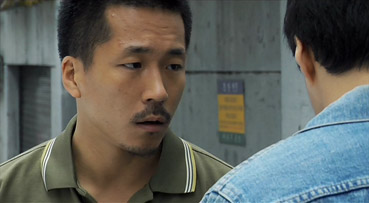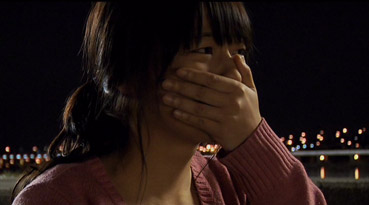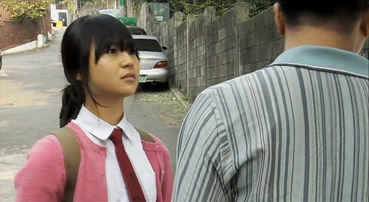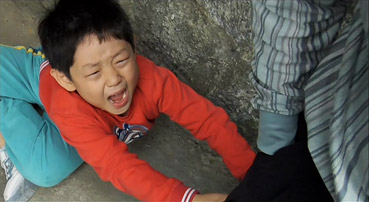|
If you're someone who shrinks at realistic screen violence and abhors the use of what is coyly referred to as strong language, then you are going to have a few problems with the Korean film Breathless [Ddongpari]. You might also want to give the first part of this review a miss, as to set the tone for the film I'm going to quote some of that language, one word in particular, and have no intention of peppering the review with pointless asterisks to protect the sensitive.
Our lead character is Kim Sang-hoon, whom we first encounter when he intercedes in a street beating by punching the male assailant senseless. He then crouches down in front of the female victim, spits in her face, slaps her repeatedly and asks her brusquely, "Why are you taking it, you cunt?" It's not the last time you'll be reading that word on the subtitles or hearing its Korean equivalent on the soundtrack. Sang-hoon uses it in almost every other sentence, to his boss, to his sister, to his young nephew (who he describes as a "little cunt"), to his co-workers, and just about anyone else within earshot. Few have the nerve to question his behaviour and those who do quickly suffer the consequences.

Sang-hoon is a perpetually angry man, a walking ball of pent-up aggression that he directs at the poor unfortunates that he is employed by his friend Man-sik to collect debts from. Sang-hoon is the man they send in when all other attempts to retrieve the owed money have failed, and however desperate you are to hold on to it, however needy your family or precarious your financial situation, he'll get it from you and leave you wishing you'd never borrowed it in the first place. And after a day spent beating others for money, he then goes home and beats his father, a man who years earlier used to similarly abuse his wife, right up to the day he stabbed her to death.
Sang-hoon lives in a state of emotional isolation maintained by his verbal and physical hostility towards others, even those with whom he appears to have the remnants of a relationship. He repeatedly belittles Man-sik in front of his employees and is curt and abusive towards his young nephew Hyung-in and his sister Heon-seo – also a past victim of domestic violence – despite his surly attempts to provide them with financial support. And then one day he meets a schoolgirl named Yeon-hee and an offbeat friendship develops, one that is set to have a profound effect on both of their lives.
Here I need to pause, mainly to assure you that this turn of events, at least as it plays out here, is light years away from the standard Hollywood-esque tale of a mismatched pair finding redemption through blossoming love. Their first meeting is a case in point, not the result of an eyes-across-the-room flash of attraction but of Sang-hoon spitting on Yeon-hee in the street and punching her cold when she angrily challenges him. He shows no real concern for his actions and only sticks around until she regains consciousness to continue their argument and call her a bullying cunt. But they do sit and talk and on some level seem to precariously connect.

What Sang-hoon doesn't realise is that Yeon-hee's home life is every bit as broken as his, a daily diet of abuse dished out by her arrogant bully of a brother Young-jae and her temperamental father, who furiously complains at the infidelities of a wife he is unable to accept has died a violent death some time ago. What should have crushed Yeon-hee has, on the surface at least, increased her resilience, an enforced maturity that recognises in Sang-hoon an underlying kinship that he reluctantly responds to. Their uneasy friendship also proves a trigger for a change of attitude on Sang-hoon's part towards Hyung-in, gruffly pretending to be his father to silence the hurtful comments of other children and offering to buy him the PlayStation that will put him on a par with his peers. The effect on Hyung-in is profound, prompting him to plead with Sang-hoon not to leave (Heon-seo's long working hours mean that he is left alone during the day) and prompting the first visible cracks in this hard-nosed adult's don't-care demeanour. The two end up cheerfully touring the shops with Yeon-hee, a scene that could so easily have slipped into cliché but is here so well handled (although a montage to music, the score is nothing like what you'd expect from such a sequence) and emotionally layered – each member of the trio becomes a surrogate family member to the other two – that it plays like a genuinely warm-hearted port in a sea of storms. These new surrogate roles continue when the three return to Hyung-in's home, where Yeon-hee introduces herself to Heon-seo as Sang-hoon's girlfriend, helps her prepare dinner, and orders Sang-hoon to set up the games console he's bought for Hyung-in before they leave.
It's a temporary reprieve, of course, but it signals for all three a possible escape route from the violence and conflict that dominates their everyday lives. Matters complicate when Young-jae lands a job at Man-sik's debt-collection firm and is paired with Sang-hoon, who trains him in his usual abusive manner without ever realising his is Yeon-hee's brother. The inability to communicate is partially responsible for almost all of the characters' woes, with even Sang-hoon and Yeon-hee suffering in solitude rather than talking to each other about their respective torments. This bottling of emotion builds to a scene of quite extraordinary emotional power when Sang-hoon's mistreatment of his father blows up in his face (and is powerfully linked to a turning point in his childhood) and he rests his head on Yeon-hee's lap and weeps, prompting her to do likewise. And yet even here, at their most painfully vulnerable, they are unable to reveal the source of their pain to each other.

The performances of the two leads are nothing short of astonishing, and I'm not talking about the Academy definition of great acting, but the sort of stripped-to-the-core truth that you just don't see in mainstream movies any more. These are actors prepared to expose the darker corners of their own emotions and invite us to embrace the inner pain they vividly expose. And we do. By all rights we should be repelled by Sang-hoon, but we're not, to the point that when a possible road to redemption appears, we're silently begging him to run towards it with all speed. As both the director and lead actor, Yang Ik-june asks us to bond with a monster of his own creation, to appreciate the source of his torment and urge him to break the cycle of violence in which he is trapped without suffering the potentially grim consequences. He's matched at every step by young first-timer Kim Kkobbi as Yeon-hee, a remarkable young actress who is as convincing in her fiery defiance as she is in her moments of heartbreaking vulnerability. One moment in particular hit me like a brick in the gut, when a distressed Sang-hoon asks her if her parents have a good life – as she lies to the affirmative, her composure momentarily falters in a manner so understated and so damned real that it came within a whisker of reducing this normally cynical viewer to floods of tears. It's the first of two such emotionally devastating moments, the second delivered in the film's closing minutes as a cinematic sucker-punch, where the only instance of non-linear storytelling hits us with a scene that we've been fooled into thinking that we've been spared. I shall say no more but you'll certainly know it when it comes.
There's no question that the extremity and frequency of the language and violence will prevent Breathless from reaching a fair portion of its potential audience – I'm screening it at a local film society in June and am already anticipating a few stay-aways and walkouts. But I'd argue that both the language and particularly the violence are fully justified here, as to understand the nature of the destructive circle in which the protagonists are trapped, we need to experience the frequency and severity of their anger and suffering, which doubles the intensity of the emotional pay-off when they temporarily break free. It's not an easy ride or a comfortable one, nor should it be, but it's still a brilliantly realised and profoundly moving work of rare honesty and intensity. Steel yourself up and see it, and understand why so many who do so end up wondering if that English title, which is not a translation of the Korean original ('Ddongpari' is a Korean slang term whose literal meaning is "dung fly"), is actually an indication of the physical and emotional state in which the viewer will likely be left.
Research suggests that Breathless was shot with the Panasonic AG-HVX100 semi-pro camcorder, the HD version of the company's DVX100 mini-dv model, which was popular with filmmakers for its film-like features, particularly its progressive 24p mode. I'm assuming Breathless was also shot in 24p, which gives you 24 frames of video per second, identical to projected film and making the transfer to film a lot easier than the 30fps NTSC of years past. If you cut out the middle man and go directly to 25fps PAL DVD, however, that one frame per second shift can cause motion issues, which is what's happened here, resulting in image judder when the camera is in motion or the subject moves within frame. Given that the film was shot entirely hand held and that there is a lot of physical movement by actors, the effect is very visible throughout the film. Whether there are similar issues on Tai Won Entertainment's NTSC Korean release I'm not in a position to say, but I somehow suspect not – though the judder is still visible on the UK trailers on this very DVD, there's no sign of it on the Korean trailer, though this has likely been sourced from a film print. In other respects the transfer is a strong one – detail is crisp, the colours true and the contrast spot on, at least in the mid-range – there are the inevitable burn-outs on whites and loss of detail in darker areas that come with the territory when shooting on video and are not a problem.

A very clear and distortion free Dolby 2.0 stereo track that has no reason to get clever with the frontal separation so tends to sit largely front and centre, with only the rare appearance of music spreading wider.
This is a limited two-disc collector's edition with the extras all located on disc 2, if you don't count the trailers for three other Terracotta releases.
Interview with Yang Ik-june (19:35)
Director and lead actor Yang, looking younger and friendlier without his moustache and contemptuous scowl, talks about how he came to make the film, the autobiographical elements, the character of Sang-hoon, the casting, directing the actors, the shooting style (handheld and close up) and the use of swear words. He reveals his admiration for the work of Ken Loach – Sweet Sixteen and My Name is Joe get a specific mention – and hopes the film's message will contribute to a more harmonious Korea. He ends with a smiling address to camera, where he tells the audience, "I wish you live healthily and express your 'fuck you'."
Interview with Kim Kkobbi (8:58)
The talented young first-time feature actor discusses how she came to be cast in the film, her first impressions of director Yang, the character of Yeon-hee (whose background was very different to her own), Yang's directing style, and the importance of this film in her career development.
Breathless Flies to Rotterdam (12:46)
Yang's own home movie footage of his trip to the Rotterdam Film Festival with Kim Kkobbi and cinematographer Yung Jon-ho has all three giggling and gooning around like excitable school kids, star-struck by a giant photo of Andrei Tarkovsky and even the poster for their own film. The pay-off comes when Breathless wins the Tiger Award and as part of their group we get to share their excitement.
London Korean Film Festival Q&A (21:34)
A post-screening interview with Yang hosted by Tony Rayns, who asks a few questions of his own before inviting the audience to chip in as well. Topics covered include the autobiographical elements, why he played the lead role, why he became a director (he wanted to be an expressionist and "spit things out"), the meaning of both the Korean and English titles, the ending (so don't watch this before the film), and whether using the film to express such strong emotions has given him peace of mind. There are also a spattering of audience reactions to the film itself.

London Press Junket (14:15)
Yang talks to the UK press – or rather just one of them by the sound of it – and covers similar ground to the above, though is more specific about his reasons for making the film, initially convinced it was due to anger at his family but later realising that it was Korean society as a whole he was annoyed at.
Korean Film Industry Special Screening (8:56)
Yang and his main cast attend a screening attended by fellow actors and filmmakers, several of whom give their reaction to the film.
Stills Gallery (3:23)
A rolling gallery of production stills set to music and treated with the Ken Burns effect.
Also included on a second page of extras are the Original Korean Teaser Trailer (1:53), the Korean Theatrical Trailer (2:01), two versions of the UK Teaser Trailer (0:37 and 0:40), the UK Main Trailer (1:57) and the French Trailer (1:15). All act as effective hooks, but the Korean teaser, comprised of a minute and a half of Yang-soon weeping before an unidentified hand slides onto his shoulders, is definitely the most intriguing.
An extraordinary, uncompromising and deeply affecting debut feature that clearly comes from the heart and is born from personal experience. The decision to make the transfer from the video master has benefits in sharpness image quality, but loses out on the very visible frame-rate shift. If you can live with that then this is a must-have release, and with only 2,000 copies of the 2-disc Collector's Edition available I'd get in there quick.
|